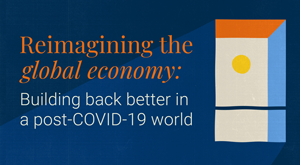This essay is part of “Reimagining the global economy: Building back better in a post-COVID-19 world,” a collection of 12 essays presenting new ideas to guide policies and shape debates in a post-COVID-19 world.
 The issue
The issue
The climate crisis had been deepening even before the COVID-19 pandemic, affecting everyone, everywhere—but especially the poorest and most vulnerable people. The world is “off-track” on both climate mitigation and adaptation, and will need to reset the emissions’ trajectory very quickly if it is to meet the collective target of global net zero emissions by 2050 and to maintain hope that global warming can be kept at around the 1.5-degree increase. The time the world has to address the climate crisis and to adapt to its impact is shrinking, while the costs of climate change are mounting along with the risks associated with inaction.1 We are also seeing an alarming rise in the loss of biodiversity and the degradation of ecosystems. Strong climate action offers the prospect of a better and more sustainable future—one that escapes a 20th century growth model based on fossil fuel dependence and the degradation of natural capital and ecosystem services, and that can deliver a net zero carbon economy by 2050. A major boost in investment is needed in order to achieve this and to meet the climate goals set by the Paris Agreement—to accelerate the replacement of aging and polluting capital, respond to infrastructure deficits and structural change in emerging markets and developing countries, and adapt to the already evident impacts of climate change.
The world needs to simultaneously tackle the COVID-19 and climate crises. The world has been transformed by the COVID-19 crisis, with deeper and broader impacts than any crisis since World War II. There has been tragic loss of life and huge social costs. The economic impacts have also been severe with a major threat of global depression. The economic impacts are particularly severe in emerging and developing countries (capital flight, drastically reduced remittances, falling commodity prices). The pandemic has highlighted that the old normal was deeply fragile and dangerous, including in the probability of pandemics. The damages due to climate change and biodiversity loss could be even bigger and more lasting than those we are experiencing from COVID-19. Decisions made now are crucial in shaping the future of people and the planet: we must not go back to the old normal.2 The imperative now in recovery is to “build back better” on a path of sustainable, inclusive, and resilient growth.
In shaping a better recovery, there is a tremendous opportunity to harness advances in technology and private sector dynamism and innovation.
The ideas
Governments need to design and implement comprehensive stimulus packages to promote a strong recovery and “build back better” in a way that tackles underlying weaknesses in the global economy, sets a course for the next decade and fosters the long-term transformation to a new form of growth and development. This is the big challenge of our time. In shaping a better recovery, there is a tremendous opportunity to harness advances in technology and private sector dynamism and innovation. A sustainable recovery can improve productivity, new forms of employment and support the transition to a zero-carbon and climate-resilient economy. It can boost employment in areas that need it most; helping to avoid extended and severe unemployment, which can de-stabilize politics and society. And it can generate strong multipliers for economic recovery and growth and can be accompanied by powerful co-benefits including reduced congestion and pollution. This imperative has been recognized by the Coalition of Finance Ministers for Climate Action. Their recent paper sets out how finance ministers have a unique opportunity to design and implement comprehensive stimulus packages that can drive a strong recovery and build a better future.3Exceptionally low prices for fossil fuels in the aftermath of the pandemic offer a propitious opportunity to accelerate carbon pricing and the elimination of fossil fuel subsidies. Carbon pricing, including subsidy reform, can be a critical component in a package of climate policies needed to restore growth and decarbonize the economic system. Together they can tilt incentives to support green recovery strategies and investments and can generate valuable revenues for investments and the just transition. Carbon pricing programs globally generated more than $45 billion in government revenues in 2019, with the potential to unlock further revenues through smart fiscal reform. 4 There may also be opportunities for governments to phase out harmful fossil fuel consumption subsidies, which are a huge burden to taxpayers. Globally, the estimated value of fossil fuel consumption subsidies amounted to more than $317 billion in 2019, and even more are provided through subsidies or tax breaks to fossil fuel exploration, development, or production.5
Concerted action and cooperation will be needed to tackle the debt and financing constraints faced by developing countries, to enable them to overcome the immediate crisis and embark on sustained recovery and transformation.6 Advanced economies have announced more than $11 trillion in fiscal support to respond to COVID-19 and recover from it, but emerging markets and developing countries face an extremely challenging context, with limited access to financing and with many likely to face debt difficulties and heightened vulnerabilities.7 A recent ILO report assesses that the estimated fiscal stimulus gap is around $982 billion in low-income and lower-middle-income countries ($45 billion and $937 billion, respectively).8 It will be vital for them therefore to mobilize all pools of finance and utilize them more effectively. In particular, exceptional financing from the IFIs will be of critical importance. While the International Monetary Fund (IMF) and the multilateral development banks (MDBs) have provided historically unprecedented support to emerging markets and developing countries to respond to the medical emergency and alleviate the immediate social and economic impacts, much larger and sustained support will be needed to enable these countries to embark on a green, inclusive and resilient recovery and sustained transformation to meet the development and climate goals.
The damages due to climate change and biodiversity loss could be even bigger and more lasting than those we are experiencing from COVID-19.
The way forward
Four pillars of international action can help build the necessary momentum on this agenda:
- Secure commitment to a global target of net zero by 2050 that can raise climate ambition and provide a benchmark for climate action. A growing number of major emitters have now committed to the net zero target including the European Union, U.K., and most recently China (to net zero by 2060), Japan, and Korea. More than 120 countries have joined the Climate Ambition Alliance—together 992 businesses, 449 cities, 21 regions, 505 universities and 38 of the biggest investors—creating the largest ever alliance committed to achieving net zero carbon emissions or “carbon neutrality” by 2050 at the latest.9
- Making a green and sustainable recovery the centerpiece of global cooperation. Collaboration across governments (including through the G-7 and the G-20) and between the public and private sectors, including a coherent sense of purpose, is essential and will come from a shared recognition that a sustainable recovery is a strong recovery.
- Building on the leadership coming from the private sector. Despite the impact of COVID-19, corporate momentum on climate action continues to build through 2020. There have been new 2020 announcements by Amazon, BP, Microsoft, Reliance, and Google among others.10 In addition, there are growing commitments from financial institutions to take portfolios to net zero with dates and milestones.11 Finally, there is growing evidence of the link between responsibility and good risk-returns.12
- Unleashing the potential of the development finance institutions. Development banks including the MDBs are uniquely positioned to support transformational change. They can help countries tackle policy and institutional impediments to unlock sustainable investments, and play a critical role in reducing, sharing, and managing risk to foster private sector investment. The International Finance Development Club will be convening the first global summit of all public development banks across the world, providing a good opportunity to build collective ambition and cooperative action.13 Greater ambition on the part of the MDBs will also require greater ambition on the part of their shareholders.
-
Footnotes
- 54 million people worldwide faced weather-related disasters this year while dealing with the effects of the COVID-19 pandemic. (Thomas Frank, “COVID Collides with Weather Disasters to Affect Millions Worldwide,” E&E News, September 2020, www.scientificamerican.com/article/covid-collides-with-weather-disasters-to-affect-millions-worldwide/)
- Amar Bhattacharya and Nicholas Stern, “From rescue to recovery, to transformation and growth: building a better world after COVID-19,” Grantham Research Institute on Climate Change and the Environment, April 27, 2020, www.lse.ac.uk/granthaminstitute/news/from-rescue-to-recovery-to-transformation-and-growth-building-a-better-world-after-covid-19/
- “Better Recovery, Better World: Resetting climate action in the aftermath of the COVID-19 pandemic,” The Coalition of Finance Ministers for Climate Action, July 2020, www.financeministersforclimate.org/sites/cape/files/inline-files/Better%20Recovery%2C%20Better%20World%20FINAL.pdf
- “State and Trends of Carbon Pricing 2020,” World Bank, 2020, https://openknowledge.worldbank.org/handle/10986/33809
- “Low fuel prices provide a historic opportunity to phase out fossil fuel consumption subsidies,” IEA, June 2, 2020, https://www.iea.org/articles/low-fuel-prices-provide-a-historic-opportunity-to-phase-out-fossil-fuel-consumption-subsidies
- Homi Kharas and Meagan Dooley, “Sustainable development finance proposals for the global COVID-19 response,” Brookings Institution, August 2020, brookings-edu-2023.go-vip.net/research/sustainable-development-finance-proposals-for-the-global-covid-19-response/
- The IMF’s latest published list (September 30, 2020) of debt sustainability analysis outcomes for low-income countries shows there are 8 countries already in debt distress and 27 at high risk of distress out of the 69 for which data is available—i.e., just over half in these categories.
- This gap represents the amount of resources that these countries would need to match the average level of stimulus relative to working-hour losses in high‑income countries.
- “Cities, regions and businesses ramp up ambition on climate change to deliver healthier economies in the wake of the pandemic,” COP25, June 5, 2020, https://cop25.mma.gob.cl/en/tag/climate-ambition-alliance/
- The growth of the World Economic Forum’s CEO Alliance of Climate Leaders to 80+ members. Initiatives such as the investors Climate Action 100+, Collective Commitment to Climate Action, UNEP FI Principles for Responsible Banking, Science Based Targets Initiative.
- The UN-convened Net-Zero Asset Owner Alliance, an international group of 29 institutional investors (as of 3 August 2020) (initiated by Allianz, Caisse des Dépôts, CDPQ, Folksam Group, PensionDanmark, and SwissRe), representing nearly $5.0 trillion assets under management, have committed to transitioning their investment portfolios to net-zero GHG emissions by 2050.
- “Sustainable investing: resilience amid uncertainty,” BlackRock, 2020, https://www.blackrock.com/corporate/about-us/sustainability-resilience-research
- See https://financeincommon.org/







